PROJECT INPUT DATA
Challenges we faced at the beginning of the project:
-
- A completely new site on a new domain
- Technical issues (multilingual self-written site on a custom CMS): duplicate pages, broken links, multiple internal redirects, slow loading speed, etc.
- No internal optimization
- Arbitrary page hierarchy
- No external links
- Few backlinks
Having determined primary directions of search engine optimization and received the client’s approval of our plan, we got down to the work.
STEP-BY-STEP IMPLEMENTATION OF THE SEO STRATEGY
Below is a list of the main works done on the site. Not everything has been completed yet, and many things need to be refined, but we are moving forward in small steps.
TECHNICAL AUDIT
A technically sound website is key to the success of SEO efforts. That is why we start each search engine optimization project with a technical SEO audit. A technical audit is essential for optimizing a site’s performance and ensuring that search engine crawlers can effectively navigate and index its content.
While, as mentioned, our client’s website is an individual technical order based on a custom CMS, many important issues related to SEO were impossible to correct.
Together with the developers, we managed to improve several essential aspects, such as scanning, rendering, and indexing. As soon as the search engine started to see the content of the pages, we could move on. We removed duplicate pages and internal redirects (as many as possible), added page micro-markup, adjusted internal linking, removed orphan pages, and improved the site’s loading speed as much as possible.
According to SERanking, we increased the site’s technical SEO score from 49 to 66.
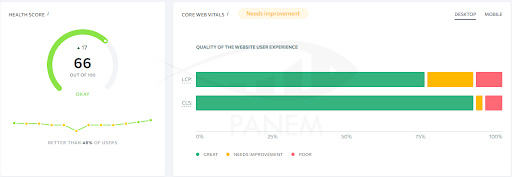
GATHERING AND CLUSTERING OF SEMANTICS
While developers were working on improving the site’s performance, we started keyword research. We gathered relevant queries according to the prioritized directions and existing pages, categorizing them into two groups based on the search intent: commercial and informational.
Keyword research is important for creating the structure of the service pages and developing a content plan for the blog.
CREATING THE STRUCTURE OF THE WEBSITE
It should be noted here that the structure of the fertility clinic’s site has been modified throughout the project due to changes in the customer’s focus and business model. As of now, we are still in the process of implementing new commercial pages, and those already present on the site have been added recently.

Based on the keyword research, we built a relevance map of commercial pages and started developing technical tasks for copywriters for landing pages.

DEVELOPING A CONTENT MARKETING STRATEGY
The biggest focus was on information pages, and the main factor that contributed to this was the ability to implement them faster than other steps.
That is why we started with developing a content plan for 6 months (at present, we prepare a content plan for 2-3 months in advance based on priorities), which covered the topics the client wanted to highlight in the blog but with high-volume search queries considered, as well as the topics our team suggested based on the competitors’ content strategies and the collected semantics.
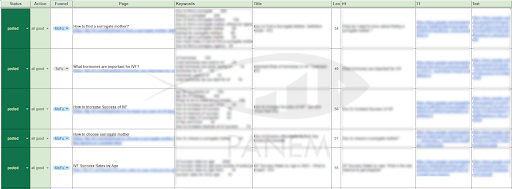
With the content plan approved, we started developing technical tasks for copywriters. Here are several important things to mention:
- We worked with a copywriter provided by the fertility clinic, which was perfect from the point of view of the specifics of the topic. However, we had to combine the copywriter’s knowledge of the topic with the search engine optimization component, so we created a guide on how to work with SEO technical tasks.
- Useful and reliable content. Medical topics, especially those related to fertility treatments, are very complex. Such articles can impact people’s health and the search engine has a special approach to them (YMYL). Therefore, the content must be reliable and accurate. All articles written by the copywriter have been proofread by fertility clinic doctors. This way, we have set up a process for writing high-quality, useful articles.
- Infographics and images. To make the articles look more presentable and improve the UX, the fertility clinic engaged a graphic designer to develop unique images and infographics.
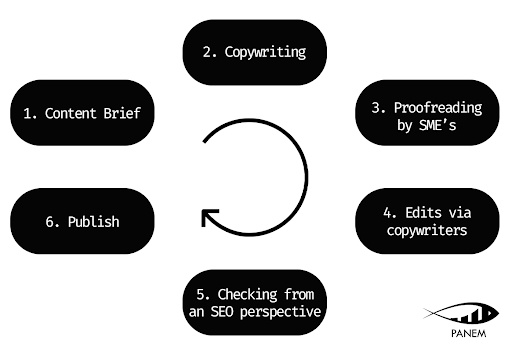
FACTORS OF TRUST AND EXPERTISE
Due to the specifics of the medical topic and the search engine’s special attitude to such sites (YMYL), we channeled a part of our SEO efforts into the E-E-A-T factors (Experience, Expertise, Authoritativeness, and Trustworthiness):
- As already mentioned, we made sure that only high-quality content was published on the fertility clinic’s blog.
- We added pages about the company, such as “Our team” with a list of doctors.
- We added pages for doctors with detailed descriptions (major, work experience, education, participation in conferences, links to social networks, etc.) and links to articles written or proofread by the doctor.

- We added author information to each article (a fertility clinic doctor who wrote or proofread it).
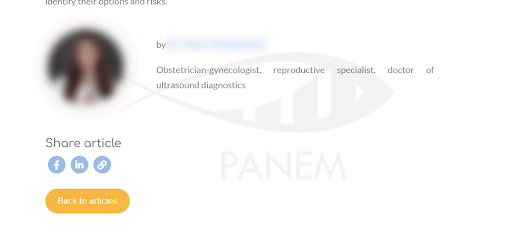
- We filled out the contact page and placed contact information in a prominent place on the fertility clinic website.
- We included links to authoritative external resources in the articles to confirm the authenticity of the content.
- Backlinks from authoritative resources. Since it is extremely difficult to get quality and relevant backlinks in the fertility treatments niche, we emphasized the importance of backlinks and asked the client to ask, if possible, for links to their site from partner sites, conferences, etc. We also selected relevant thematic platforms and together prepared articles for guest publications. For traditional guest posting, we had a really limited budget. We also crafted a comprehensive article on the success rates in the fertility treatments industry, which organically generated three backlinks from authoritative resources.
THE RESULT
This is a GSC screenshot showing the results during the last 12 months. Despite adding only 1-2 articles a month, intense competition, and regular algorithm updates, the dynamics stayed positive.

This is an Ahrefs screenshot demonstrating the growth of traffic and backlinks:
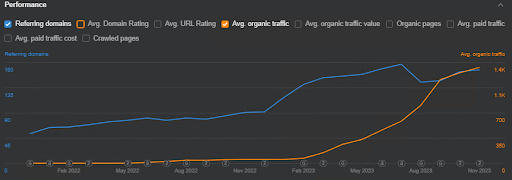
And this is the dynamics of search queries rankings on search results:

This screenshot shows how rankings changed:
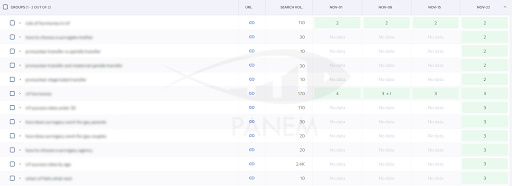
Everything described above was done over a period of more than 16 months. In addition, many other SEO strategies were developed and implemented, such as internal linking, additional semantics collection, updating of some articles, checking search results for a change of intent (due to delays on the part of the client, quite a lot of time sometimes passed between the text being ready and its actual publication, during which search engine updates took place, so there were cases when the intent changed from commercial to informational and we prepared a blog article on this topic), etc.
A total of 22 blog articles and 7 service pages were added to the fertility clinic website during this period. Unfortunately, due to the slow pace of the project, the results weren’t obtained as fast as expected.
A successful SEO campaign is a long-term process: months can pass from the moment a page is published to when it gets into the top 3 positions on search results. The frequency of adding or updating content directly affects the speed of obtaining a result.
We continue working on this project and move in small steps towards a constant increase in relevant organic traffic. We’ll get back to this project in the next case study, where we’ll tell you about optimizing commercial pages, increasing the number of transactions, and working with CRO.